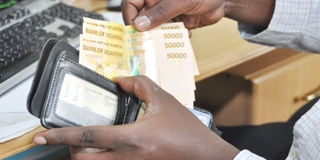Tweak your budget for tough times

A man checks his wallet. The covid-19 pandemic has forced many people to adjust their lifestyle. PHOTO BY ERONIE KAMUKAMA
Life before the Covid-19 pandemic was fairly predictable. We ate what we wanted, where we wanted and when we wanted.
We shopped for things we sometimes never needed and we had reason to be where we never really needed to be.
Not anymore!
On March 30th life suddenly changed. When the lockdown was announced because of Covid-19, nobody was certain of how things were going to turn out.
Everybody was scared!
The important thing was how to survive, be healthy, and live to tell the next story.
To achieve this, there are some basic human needs that all come back to spending money.
Dr Fred Muhumuza, an economist and lecturer at Makerere University, says people need to prioritise items such as food, rent, and utilities. This should be followed by provisions for emergencies such as health or sickness.
“It is important to negotiate and defer any payment if it is going to significantly reduce the available cash flow to the detriment of abode priorities.
So, here are some tips and experiences on how you can manage your household incomes during Covid-19 without going insane.
Mercylyn Nalusiba, a mother of three, panicked just like everyone else. But getting into bulk purchases for the family needs and essentials helped her.
“So, I drew a budget of mostly the essential things that we needed to take us through a month,” she shares.
She stocked mostly dry rations of foodstuffs, charcoal, sugar, toothpaste, toiletries and some medication as guided by the social media doctors on Covid-19.
Since she was home much of the time, Nalusiba was able to monitor the use of the stuff.
“Surprisingly, they run us for almost and one and a half months and not for a month as I had earlier envisaged. So, I realised that by bulk purchases, I saved almost 20 per cent on the usual home expenses,” she shares.
Just like Nalusiba, Sam Ssemaganda, an author and activist bulk stocking of essentials were key.
“Picking out and concentrating on key essential plus bulk stocking has worked and this was mainly stocking dry food and other essential items,” He shares.
Because fewer cars were allowed on the roads, Nalusiba in a way saved money on fuel going to the workplace through pool transportation.
“I have been working but using pool transport from office. So, for almost two months, I haven’t had to spend on fuel,” she shares.
As a baker, Nalusiba tried as much as possible to engage her children in making their own bites to snack on rather than getting them from the supermarket.
“When it came to fancy meals like pizza and pies, all these were prepared home instead of ordering them from out. That way, they have variety and appreciate the fresh bakes,” she says.
Making snacks at home should continue after the lockdown. This saves money and helps the family to bond.
“We also saved on money without eating out. I loved a good evening out and perhaps that would be every weekend,” Nalusiba shares.
Nalusiba has since developed a frugal mindset towards money.
“I appreciated saving more than spending the money. Two months down the road, I have maintained the practice of budgeting and monitoring the stuff for the household. That meant eating healthier meals. I don’t have to spend on children’s snacks anymore,” she adds.
And true to what they say, there hasn’t even been a single bout of flue or tummy ache treated.
Although Nalusiba subscribes to health insurance, not all ailments can be attended to by the insurance cover.
She now believes that exercising can you keep fit and reduce the times you visit a health facility.
[email protected]




